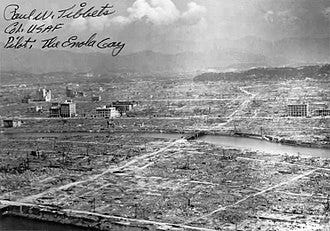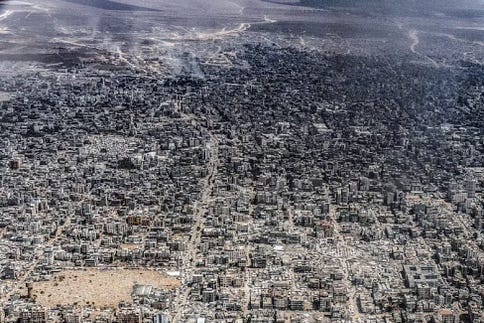Hiroshima to Gaza: VIDEO: Is Israel Using Nuclear Blackmail, Including against the US?
Are US negotiators ignorant of Israel's nuclear threats?
The U.S. government dropped nuclear bombs on Hiroshima and Nagasaki 80 years ago this week.
While no state has detonated a nuclear bomb over a city since, the US, Israel and other states have used nuclear weapons as a thief uses a gun, brandishing it to coerce. John Steinbach notes in his in-depth paper on Israel’s nukes that it has a policy of “nonconventional compellence” to effectively threaten the US. I summarized his paper here. Among his points:
During the 1973 war, Israel used nuclear blackmail to force Kissinger and Nixon to airlift massive amounts of military hardware to Israel. The Israeli Ambassador, [Simcha] Dinitz, is quoted as saying at the time, “If a massive airlift to Israel does not start immediately, then I will know that the U.S. is reneging on its promises and. we will have to draw very serious conclusions...”
I drew on his research for an interesting Q and A — video below.
In 2024, an organization of Hibakusha — Nihon Hidankyo — finally received the Nobel Peace Prize. The group should have gotten the esteemed award decades ago, but the apparatchiks in Scandinavia kept putting it off. Obviously in 2024 such an award should have gone to someone trying to stop the slaughter in Gaza, but the Committee chose to give it to the Hibakusha just then. Middle East Eye reported in “Nobel winning Hiroshima survivor’s Gaza comparison angers Israel” that the leader of the group, “Toshiyuki Mimaki said Gaza workers deserved a Nobel prize after his organisation was given the award.” He said: “In Gaza, bleeding children are being held by their parents. It’s like in Japan 80 years ago.”
Hiroshima 1945.
Gaza City now.
At a recent event at Busboys and Poets — “Iran: What Comes Next?” — I asked if Israel could be issuing nuclear threats, including against the US.
One panelist, Sina Azodi, an Assistant Professor of Middle East Politics at the George Washington University’s Elliott School of International Affairs, said “absolutely yes.”
Another panelist was Alan Eyre, described on the program as “a core member of the US nuclear negotiating team from its 2010 start to the 2015 Joint Comprehensive Plan of Action (JCPOA) agreement with Iran.” He seemed unfamiliar with the history and said: “No! It doesn't need to! I don't think so. I mean, I defer to my colleagues here for the historical background.”
Video and transcript below, many thanks to Kelley Lane:
Husseini: I do appreciate that the issue of Israel's nuclear weapons has come up. And there are two issues that I'd love the panel's reaction to. One is just prior to this crisis, Iran claimed that it had hacked Israel's intelligence apparatus and got information about Israel's being buttressed by the US and other Western powers and its nuclear capacity. And the other is the utility of Israel's nuclear capacity. I have — the biggest reading I've done during this crisis is John Steinbach, a great independent peace activist wrote a book basically, 25,000 words, on Israel's nuclear capacity. And the conclusion that he comes to is that it basically is a method of blackmail to the United States. And it is born out of 1956 when the US refused to let Israel and the colonial powers attack Gaza and Egypt and was utilized in 1973. And that basically it's a trump card for Israel that if you don't do what we say, we're gonna go nuclear and you better do what we say. How operative is that and how conscious is the US government of it?
Azodi: Very briefly, absolutely yes. And this is what Golda Meir did to President Nixon [in 1973]. She came to the US and said, either you provide me with all the weapon systems that I need, or else I have no choice but to use nuclear weapons. And specifically, she had threatened the use of tactical nuclear weapons to defend Israel. And look, you can use nuclear weapons to garner support to coerce your allies to come to your help, or you can blackmail your enemies not to attack you. You brandish this big, as Donald Trump would like to call it, big, beautiful weapon, and nobody dares to attack you. So, absolutely, yes.
Negar Mortazavi [moderator]: How many more questions?
Andy Shallal [host]: Sam wants a follow-up because Sam always gets a follow-up, so here he is.
Husseini: Just, I mean, doesn't that mean that if this is the root of not just Trump, but a whole series of US presidents have basically acquiesced to Israel, that there's a need to focus on that issue, confront it, so that this doesn't, and I'd — ahem — love the “former ambassador's” take on this as well.
Mortazavi: You have to take that title.
Eyre: I love this crowd. Well, I mean, again, I'm unclear as to your point. Are you talking about the prevailing double standards in international law?
Husseini: No.
Eyre: So, I mean, repeat in a short declarative sentence the question, please.
Husseini: Is Israel blackmailing the United States?
Eyre: No! It doesn't need to! I don't think so. I mean, I defer to my colleagues here for the historical background.
Husseini: So, ‘73? —
Eyre: But, I mean, look. Israel, for a variety of reasons, has long been an incredibly tight strategic ally of the United States for both obvious and non-obvious reasons. They got nuclear weapons. Who else has an undeclared nuclear weapons program? Is it Pakistan? India?
Azodi: They're both out. Both of them are out. They're openly having nuclear weapons.
Eyre: No, but are they part of the NPT?
Azodi: No, they're not.
Eyre: Yeah, OK. So President Eisenhower did atoms for peace. And said, we'll give you nuclear power if you join the NPT. Now, what people forget also is part of the NPT has responsibilities for the nuclear powers to lower their nuclear arsenals. Has that happened? No, of course not. So the NPT is a very imperfect vehicle. Iran, for a variety of reasons, maintained its membership, but then didn't do all that which was necessary to have the IAEA say that it was in full compliance, which led us to where we are now. One final point is that the main reason Iran has a nuclear energy program is for the potential to have nuclear weapons, at least the way it seems to me, in the sense that Iran's nuclear power provides 1% of the total energy to Iran. They have spent billions and billions on it. And they've also invited all sorts of problems, which we're seeing now. So if I were running Iran, I would have gone solar and renounced my nuclear program. Even now, Iran would be well served to accept, I think, not surrender, obviously, but increased verification measures from the IAEA. And even stopping enrichment on Iranian soil. Iran sees that as defeat, but better to be defeated and live to fight another day. We have two more.
Mortazavi: No more nuclear questions.
Shallal: One here and one there.
Why Does "The Squad" Refuse to Acknowledge Israel's Nuclear Weapons?
|



No hay comentarios:
Publicar un comentario